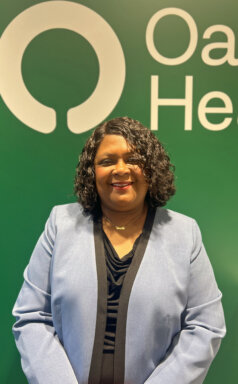Guyanese-born medical doctor serves as senior medical director at Oak Street Health in the Bronx

Guyanese Dr. Yonette Davis serves as a senior medical director at Oak Street Health, where the majority of patients are people of color. She works out of Oak Street’s Allerton center in the Bronx.
Dr. Davis told Caribbean Life on Tuesday that she treats older adults and Medicare recipients, especially adults who are suffering from chronic conditions like hypertension, diabetes, kidney disease, emphysema and chronic obstructive pulmonary disease (COPD). COPD is a chronic inflammatory lung disease that causes obstructed airflow from the lungs.
The doctor, who is also certified in internal medicine, geriatrics and palliative care, said many of her patients also have mental health issues, like under-diagnosed depression, as well as social and economic issues, such as dealing with violence and food insecurity.
Dr. Davis, who has experience working in population health, transitions of care, clinical education and health policy, said her mission is “to bring high-level quality care to the older population with complex health needs and to change the health trajectories of historically disenfranchised populations.”
She said she migrated from Guyana at 10, spending her childhood in Brooklyn.
She remembers going to a hospital growing up and being given a number. And, during her visit, she said didn’t see any doctors who looked like her.
Dr. Davis said this experience made her feel like “a number in a system,” and that she was being “experimented on.”
She said this inspired her to enter the medical profession, with the goal of preventing anyone from feeling like that again.
Dr. Davis said she joined Oak Street Health as a senior medical director in September 2022. Prior to that, she was medical director at The Centers HealthCare, Subacute rehab facilities.
She was also a regional medical director at Optum, United Health Group, and had served as the chief of the Division of Geriatrics at the Brooklyn Hospital.
Dr. Davis received her medical degree from the Icahn School of Medicine at Mount Sinai in 1996.
She went on to complete her residency in internal medicine in 1999 and fellowship in geriatric medicine in 2008 at Montefiore Medical Center.
She also received an Executive Masters in Healthcare Leadership from Brown University in 2016.
The doctor moved to The Bronx in 1996 and has been a resident of the borough ever since.
She said she has been a practicing physician since 1999, and often cares for her patients “with my 10-year-old self in my mind.
“It serves as a reminder to take a moment to understand the patient before proceeding,” she said. “It is always important to meet the patient where they are in their understanding of the issue, effectively communicating and garnering trust.”
Dr. Davis said her experience of being an immigrant, female, person of color, as well as growing up in New York City, have impacted her approach to healthcare and how she interacts with her patients.
“I have embraced and fought for cultural diversity in medicine,” she said. “Providers who embrace learning about other cultures are more likely to get better patient engagement scores and establish stronger trust with their patient base.
“I have a passion for educating on cultural diversity in medical education; and, in my past role in academic medicine, I always spoke to historical wrongs in medicine and how it might impact trust among our populations,” she added.
Dr. Davis said she has always chosen to work with populations that historically had the worst health outcomes – such as the elderly, Black and brown populations, those with a lower socioeconomic status – “because it all comes back to my experience as a 10-year-old girl who felt misunderstood and like I was part of an experiment.
“It’s my life mission to change the health curve for disenfranchised groups,” she affirmed. “At Oak Street Health, we hire from the community. As a provider group, we learn so much about the communities we serve from the staff.
“Our patients are able to see staff that look like them, speak the same language, eat the same foods as them, which lead to more trust in the providers,” Dr. Davis added.





